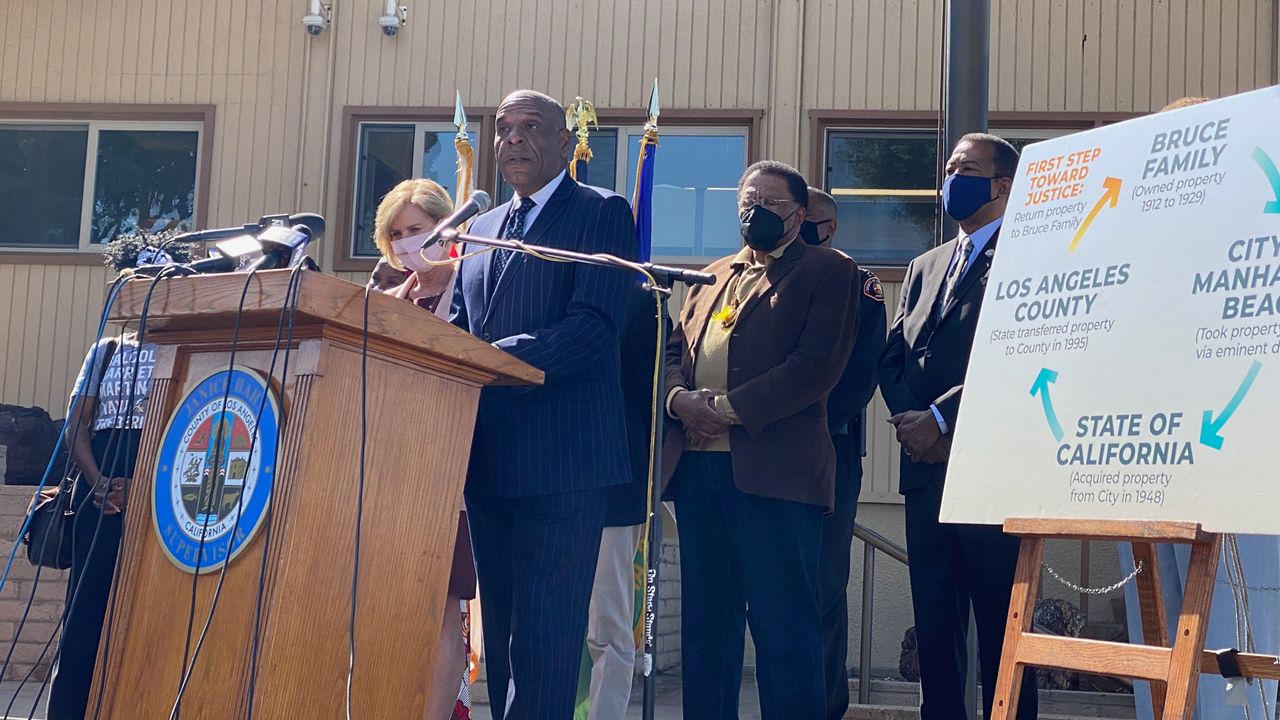LOS ANGELES — California Senate Bill 796 — which clears the way for the beachfront land known as Bruce’s Beach to be returned to the Bruce family descendants — passed the California Senate overwhelmingly on Wednesday, moving the bill one step closer to becoming law.
“I could be here all day speaking to the importance of what this is about, but I think our actions here today will send a message clear across the state, clear across the nation, that we can right a wrong,” said Sen. Steven Bradford, of Gardena, who authored SB 796. The bill received 37 votes in favor, none opposed, with three abstentions.
The bill now moves on to the California State Assembly. Should it pass there with a two-thirds margin and subsequently be signed into law by Gov. Gavin Newsom, it would take effect immediately. Once it becomes law, Los Angeles County Fourth District Supervisor Janice Hahn has pledged to begin the work to return the property to the Bruce family.
Bradford, alongside Hahn, Second District County Supervisor Holly Mitchell, and Assemblymember Al Muratsuchi, announced the legislation in April, at the foot of Bruce’s Beach.
The bill authorizes Los Angeles County to “sell, transfer, or encumber Bruce’s Beach” while excluding the property from restrictions — including those that would force it to be used only for public recreation and beach purposes.
The land now known today as Bruce’s Beach was once known as Bruce’s Lodge, a Black-owned, Black-friendly beach resort during the 1910s and ‘20s that sat at what was then the edge of Manhattan Beach. Willa and Charles Bruce owned two parcels of land that they built up into a successful resort over the course of a decade, and became so successful that they drew other Black residents and businesses into the area.
But by 1929, after years of targeted harassment by both residents and the city’s Board of Trustees (which was admitted to in a newspaper column more than a decade later), the Bruces and four other Black families were forced off of their land by an eminent domain proceeding. The city claimed they would build a park from the land.
A park would not be completed until the late 1950s.
In 1995, Los Angeles County acquired the land of the former Bruce’s Lodge. A lifeguard training station stands there now. Should the bill become law, the County hopes that it can work out a lease to continue using the property until the Bruce descendants decide their next steps.
In his remarks, Bradford noted that Willa Bruce paid $1,225 for the resort’s two lots — land that, today, he said is worth more than $75 million. In their settlement with the city, the Bruces were paid $14,500 — which, owing to inflation, is equivalent to about $226,000 in 2021.
Amid the racial reckoning of 2020, Black activists began agitating for the city to right the racially motivated wrongs of its past — those activists, including Kavon Ward, of Justice for Bruce’s Beach, were credited in Bradford’s statement today.
The matter of Bruce’s Beach is sensitive in Manhattan Beach today. Despite calls for a formal apology to the wronged families, the city issued a “statement of acknowledgement and condemnation”; an anonymous group of citizens took to posting inflammatory advertisements in local newspapers; and a minor controversy spiked when a Bruce family representative was issued a parking ticket that he suggested was racially motivated.
The Manhattan Beach City Council does not appear to have taken a formal position on SB 796. However, prior to Wednesday's vote, Sen. Henry Stern of Calabasas warned that “if Manhattan Beach imposes undue restrictions on the Bruce family’s resumption of their private property interests, we’re gonna have issues.”
Hahn hopes that the passage of SB 796 can create a path for the rest of the county to follow.
“I want to thank our State Senators who voted for this important legislation and have supported Los Angeles County’s effort to return the Bruce’s Beach property to the Bruce family nearly a century after it was stolen from them,” Hahn said. “It is my hope that once this legislation passes, Los Angeles County can set an historic precedent for how we as a nation should go about beginning to atone for the sins of our past.”
In his closing remarks, Bradford said that his bill recognized that a great debt is owed to the Bruce family, and that it might clear a path toward clearing that debt.
“There’s an African proverb that exists that states that, until the hunt is told by the lion, the story will always favor the hunter. And that's what American history has been about,” Bradford said — that people of various ethnicities and racial backgrounds often worked hard, had their stories dismissed, and were prevented from owning land and property.
“They were prevented from living in certain neighborhoods. And when they did acquire property and try to do the right thing. Again, our government found a way many times to take that privilege away. This bill recognizes that if you can inherit generational wealth, you can inherit generational debt.”



